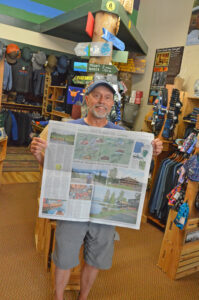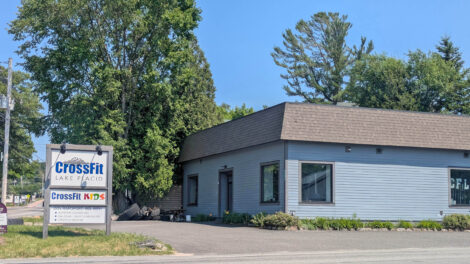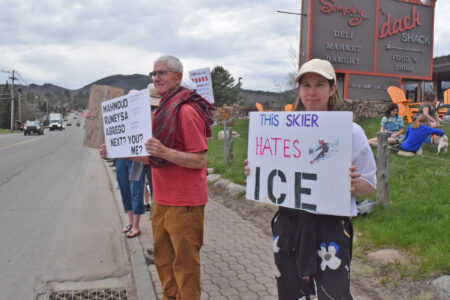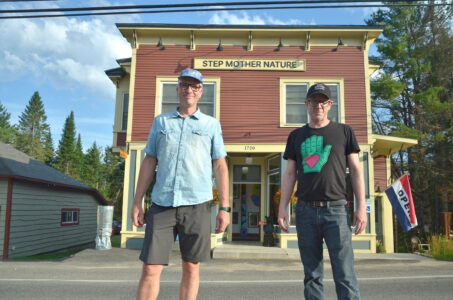Adirondack Foundation hears Tupper nonprofits’ needs

Attendees and presenters at Monday’s Adirondack Foundation meeting at the Tupper Lake town offices include, from left, Patti Littlefield, Sandy Strader, Mike Gillis, Phyllis Crate, Don Sabin, Jessica Kohan, Chris Morris, Carol Fuller, Cali Brooks, Jerry Hayes, Carol Levy, Paul O’Leary and Mark Moeller. (Enterprise photo — Ben Gocker)
TUPPER LAKE — About 15 people from the local nonprofit sector began their week Monday in the basement of the Tupper Lake town offices, asking representatives from the Adirondack Foundation about available grants.
Town Supervisor Patti Littlefield presided over the meeting and said her primary aim in arranging it was to introduce the nonprofits in Tupper Lake, many of whom were not familiar with the Adirondack Foundation, to the philanthropic organization that serves the entire Adirondack region.
“The primary way we function is to connect with generous individuals, families or businesses, and then help them find means to give back to the things that matter to them,” said Chris Morris, communications officer for the foundation. “We do about $2.5 million in grants a year to the community, and we also provide — which is why we’re here today — some nonprofit and community services.”
According to Cali Brooks, president and CEO of the Adirondack Foundation, nonprofits in the Tupper Lake area have received $354,000 over the past three years through the foundation’s funds.
“A lot of it is scholarships to schools; a lot of kids are going to college,” she said, referring to a printout of all the fund recipients from Tupper Lake. “But it’s not just scholarships. We try to offer a lot of support to programming at the school and a variety of others. The library is on here; lots of different organizations are on here.”
Groups with representatives at Monday’s meeting included the Knights of Columbus, Goff-Nelson Memorial Library, Adirondack Public Observatory, and Thrifty and Nifty. Tupper Lake police officer Mike Vaillancourt also attended with questions about funding for the annual Bike Rodeo.
Mike Gillis, a Tupper Lake native who now splits his time between the Adirondacks and Myrtle Beach, South Carolina, attended with questions regarding a mental health organization he and his wife started in South Carolina and are looking to bring to Tupper Lake.
A common theme among the groups was funding for building maintenance.
“The K of C is an organization of less than 100 members,” said Don Sabin of the Knights of Columbus. “And we have a mammoth building built in the early ’30s. It needs repairs on the roof, and the primary reason we need to fix it is that we have so many social events there for the community at little or no cost.” Aside from providing more 400 Thanksgiving dinners every year, the building is a designated emergency shelter, Sabin pointed out.
Carol Fuller, a library board member, chimed in with details of work to restore the library’s deteriorating facade and improve existing HVAC systems. Though the library already receives an annual gift through an Adirondack Foundation fund established by Alberta Moody, Fuller mentioned novel approaches the library has taken to generate additional money, including raffling off a Nissan Z sports car.
Carol Levy, president the Adirondack Public Observatory, made an impassioned case for science education in the region.
“We are a scientific organization,” Levy said. “A lot of our funding would come from STEM (science, technology, engineering and mathematics) grants. I see what we are doing and what other scientific organizations are doing as an emergency for the future. Our kids are coming out of high school today knowing less science than they did 20, 30, 40 years ago.
“We offer in this area a program that would present science to kids within a 50-mile radius on a daily basis. Once we build this thing, it will change the economy of Tupper Lake a little bit. It will offer jobs. It will do a lot for both the scientific community, tourist community and the economy. But I see studying and learning science, especially math, as an emergency for the United States of America.”
After Levy spoke, Vaillancourt spoke about the need for more support to grow the Bike Rodeo. This past Saturday, he said, more than 400 people came to the rodeo from places as far away as Canton and Malone.
“Everything was done through donations,” he said. “We gave away 200 hamburgers, 300 hot dogs, 15 pizzas, almost 20 gallons of ice cream sundaes, 16 gallons of Slush Puppies.
“Every year is tougher and tougher because the event is getting bigger and bigger, so it’s getting harder and harder to find money.”
Ninety-eight percent of the grant money Adirondack Foundation can award nonprofit organizations is restricted, meaning it must be used in accordance with donors’ provisions.
“Clearly infrastructure and maintenance and building things has emerged as a theme here,” Morris said at the close of Monday’s session. “We have and we will make grants to support that kind of activity, but to be perfectly honest, though, I’d say we’re somewhat limited in our ability to do that. We make a lot of grants to a lot of communities all across the region, so our unrestricted funds are somewhat limited.”
Morris suggested nonprofits in the area look to the Adirondack Foundation to support programming needs for seniors and children, which would then allow them to shift their costs from those types of programs to maintenance costs.
“The most important take away is to say you should call our office if you have questions,” Morris said. “If you have an opportunity where you need some funding, just let us know. That’s the best thing you can possibly do.”




